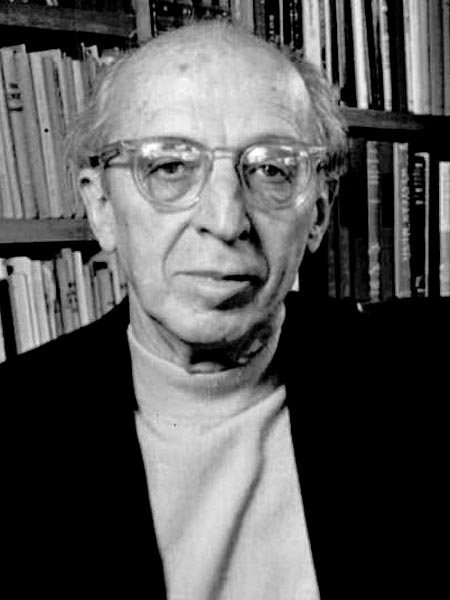 |
| Aaron Copland (Wikipedia) |
Note: Born in humble circumstances in an immigrant community, Aaron Copland became the most American of composers. Follow his path to success.
Get Ready: Which do you prefer, "serious" music or pop music? Or is there a proper time for each?
American composer Aaron Copland (1900-1990) is best known for using folk songs, ethnic rhythms and open harmonies to create an "American style" of serious music.
Born in Brooklyn, New York, he was the youngest of five children. His father was an immigrant who ran a small department store. The Coplands lived over the store, where all of the children worked helping their father. Aaron's mother played the piano and sang; she made sure all of the children took music lessons.
Like scientist Linus Pauling (born the following year), young Aaron loved reading, often sitting on the front steps of the store with a book. When he was eleven, he wrote the story and some music for an opera; by age 15 he had decided to become a composer.
While studying with excellent teachers, he regularly attended performances of the Metropolitan Opera and the New York Symphony. Here he learned the standard musical works. (Remember, this was before radio and the easy availability of sound recording. Live performances were often the only way to hear music!)
He later studied in Paris, and returned to the U.S. in 1925 with the intention of becoming a full-time composer. It was not until the late 1930s and early 1940s that he wrote some of the works for which he is best known today.
Billy the Kid (1938), Rodeo (1942), and Appalachian Spring (1944) were ballets, though they are often performed today without choreography. Billy the Kid uses American folk songs and cowboy songs. Rodeo has five sections with titles like Buckaroo Holiday and Hoe-Down. (Buckaroo is a word meaning "cowboy"; a "hoe-down" is a country-style dance event.) Appalachian Spring uses songs from the traditions of the Shakers--a religious group--and includes use of the classic song "Simple Gifts."
Some of Copland's other works, like Fanfare for the Common Man and A Lincoln Portrait (both 1942), were meant to encourage Americans during the Second World War. A Lincoln Portrait uses words from that president's writings, including the "Gettysburg Address."
Copland wrote little after the 1960s, saying he was seldom inspired: "It was exactly as if someone had simply turned off a faucet." He spent his later years conducting orchestras and doing recordings, and died at age 90.
--------Read more: https://en.wikipedia.org/wiki/Aaron_Copland
Practice: Match the term to its definition below:
- Appalachian
- ballet
- choreography
- encourage
- ethnic
- fanfare
- immigrant
- inspired
- intention
- serious music
- of a mountainous area in the eastern U.S.
- having good ideas
- plan; purpose
- inspire with confidence; cheer up
- not "pop"; more like classical
- a person who moves into a country
- planning of dance performances
- belonging to or coming from a particular cultural group
- a formal kind of dancing
- musical flourish, often on trumpets
Answers are in the first comment below.
Submitted to the Shenzhen Daily for April 21, 2015
This lesson received 2 visits on my old site between April, 2016, and August, 2021.


Answers to the Practice: 1. a; 2. i; 3. g; 4. d; 5. h; 6. j; 7. f; 8. b; 9. c; 10. e
ReplyDelete